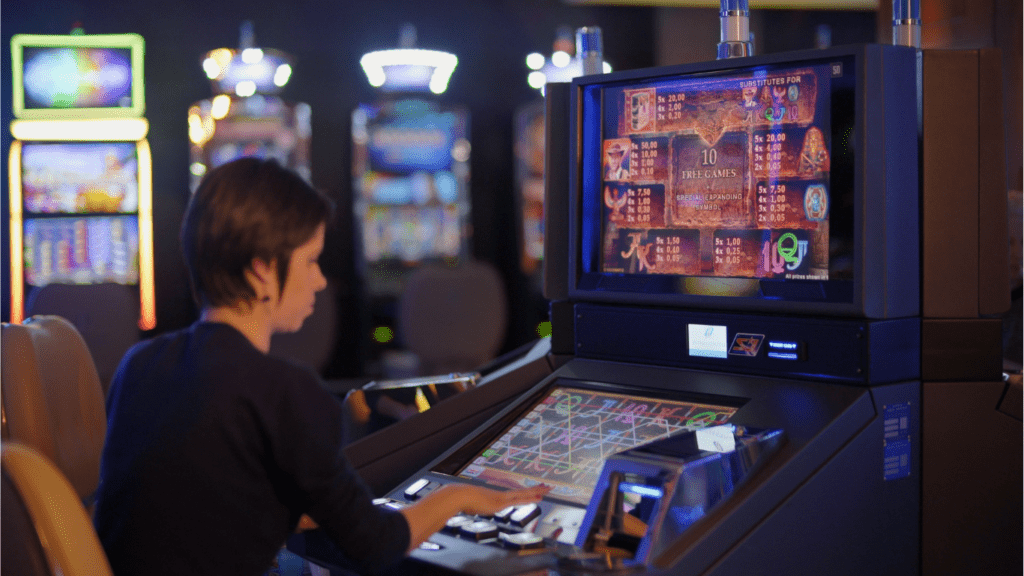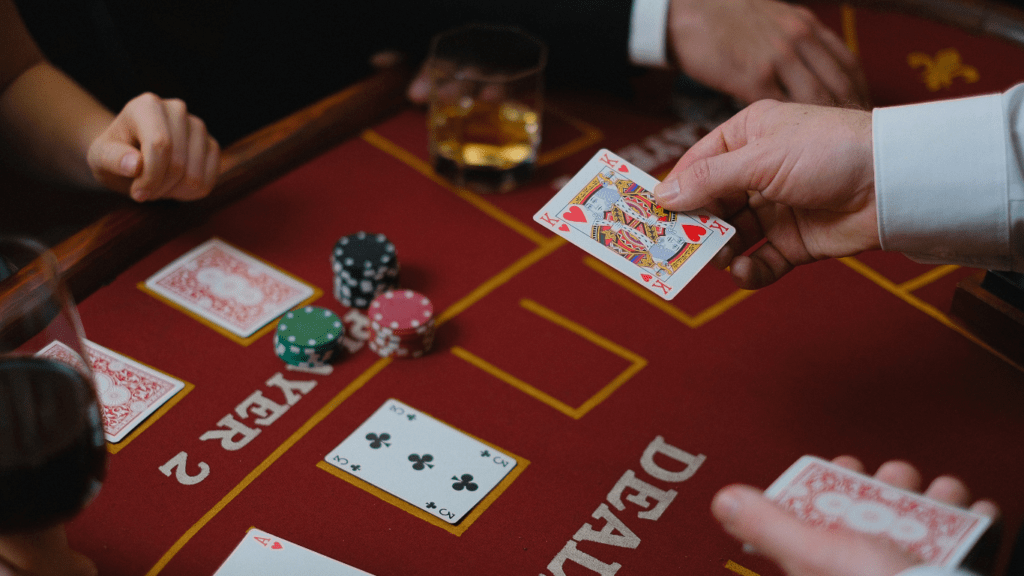Understanding Slots and Table Games
When entering a casino, it’s crucial to understand the fundamental differences between slots and table games. Each option offers a distinct experience, catering to various player preferences and skills.
What Are Slot Machines?
Slot machines, often called slots, are gambling devices that generate random combinations of symbols. Players insert money and press a button to spin the reels. If symbols align in a winning combination, the machine pays out according to a paytable. Classic slots have three reels and a single payline, while modern video slots offer multiple paylines and bonus features. Progressive slots link machines together, increasing the jackpot with each bet. RTP (Return to Player) percentages vary, typically ranging from 85% to 98%.
What Are Table Games?
Table games include a variety of casino games played on a specific table and managed by dealers or croupiers. Common examples are Blackjack, Roulette, Baccarat, and Poker. Table game rules and strategies differ, influencing the odds and player interaction. Blackjack requires players to beat the dealer’s hand without exceeding 21, while Roulette involves betting on where a ball lands on a spinning wheel. Baccarat is a comparing card game with three possible outcomes: player, banker, or tie. Poker, encompassing different variants like Texas Hold’em, combines chance and skill, requiring strategic betting and bluffing. House edge varies by game, influencing overall player advantage.
Pros and Cons of Slot Machines
Slot machines offer unique features that cater to specific gaming preferences. They’re simple, colorful, and fast-paced, making them a popular choice.
Advantages of Playing Slots
Slot machines provide various benefits that appeal to many players:
- Ease of Play: Slots are straightforward and don’t require knowledge of any rules or strategies. Insert money, push a button, and watch the reels spin.
- Variety: There’s a vast selection of themes, from ancient civilizations to popular movies. This variety keeps the experience fresh.
- Flexible Betting Options: Players can choose from a wide range of bet sizes. Beginners can start small, while high rollers can go for larger bets.
- No Social Pressure: Slots don’t involve other players or dealers. This isolation lets you play at your own pace without interaction.
- Progressive Jackpots: Many slots offer the chance to win big with progressive jackpots. These jackpots grow over time, sometimes reaching millions.
Disadvantages of Playing Slots
However, slot machines also come with several downsides:
- High House Edge: Slots usually have a higher house edge than table games. This means, over time, the casino earns more from slot players.
- Lack of Skill: Since slots are purely based on luck, no strategy improves your odds. This can make the game less engaging for strategic thinkers.
- Fast-Paced Spending: The quick nature of slots can lead to rapid spending. Without careful management, you might spend more than intended.
- Lower Interaction: While some enjoy the solitude, others might miss the social interaction found in table games. Slots lack the communal aspect of games like poker or blackjack.
- Potential for Addiction: The rapid play style and frequent wins can lead to addictive behavior. Casinos design slot machines to be engaging, sometimes making them hard to walk away from.
Pros and Cons of Table Games

Table games offer unique experiences in the casino, presenting both advantages and disadvantages.
Advantages of Playing Table Games
Playing table games provides several benefits. First, these games often have a lower house edge compared to slots, which increases the chances of winning. For instance, blackjack typically has a house edge of around 1%, whereas slots can have an edge ranging from 2% to 10%.
Second, table games involve more skill-based strategies. Players can develop and implement strategies in games like poker and blackjack to improve their outcomes. This adds an intellectual aspect that slot machines lack.
Third, social interaction is a significant pro. Table games like craps or roulette promote camaraderie among players. Dealers and other players create a lively atmosphere, enhancing the overall casino experience.
Additionally, table games offer deeper engagement. The complexity and variety of rules in games like craps or baccarat keep players invested for longer periods. This contrasts sharply with the often repetitive nature of slot machines.
Disadvantages of Playing Table Games
Despite their benefits, table games also have several drawbacks. First, they often require higher minimum bets. Table games such as baccarat or blackjack typically have minimum bet requirements ranging from $5 to $25 or more, which can be a barrier for casual players.
Second, the learning curve for table games can be steep. Games like craps, poker, and even roulette have complex rules and strategies. This can be intimidating for beginners and may discourage participation.
Third, the social element can be a double-edged sword. While interactions can be positive, they can also be stressful. The pressure to perform well in front of others and the potential for conflicts with other players or the dealer can be off-putting.
Lastly, table games have a slower pace compared to slots. While some players appreciate the leisurely pace, others might find it less thrilling. The slower game progression means fewer hands or rounds are played, potentially reducing the excitement level.
Evaluating the Player Experience
The player experience varies significantly between slots and table games. Each type offers unique advantages and challenges, catering to different preferences and play styles.
Which Games Offer Better Odds?
Table games generally offer better odds for players. Games like blackjack, baccarat, and craps can have a house edge as low as 1%, 1.06%, and 1.36%, respectively, when played with optimal strategy. In contrast, slot machines typically have a higher house edge, ranging from 2% to 10%, depending on the game design and casino regulations. The probability of winning is higher in table games for players using skill-based strategies; for example, a blackjack player using basic strategy can significantly reduce the house edge.
Social Interaction: Slots vs. Table Games
Social interaction differs markedly between slots and table games. Slots cater to solitary play, allowing players to focus without external disruptions. This isolation can appeal to those who prefer solitude or playing at their own pace. On the other hand, table games encourage social interaction. Players often engage with dealers and fellow participants, creating a dynamic and communal atmosphere. Games like poker and craps thrive on this interaction, often incorporating camaraderie and shared excitement. Interaction levels impact personal preferences, making the choice between slots and table games a matter of individual taste.
Cost and Payouts
Understanding cost and payouts is crucial when deciding between slots and table games.
Betting Strategies and Minimum Bets
Slots often have fixed minimum bets, sometimes as low as $0.01 per spin, making them accessible for casual play. However, to maximize jackpot chances, players might need to bet larger amounts. Table games like blackjack and roulette typically require higher minimum bets, often starting at $5 or $10, but they also offer more complex betting strategies. Using strategies like card counting in blackjack can impact player odds, while slots rely mostly on luck.
Comparing Payout Potentials
Slots offer varying payout percentages, usually between 85% and 98%, depending on the machine and casino. Progressive slots present significant jackpots, sometimes reaching millions. Conversely, table games often have higher payout potentials due to lower house edges. For example, blackjack often has a house edge of around 1% with optimal strategy, while slots’ house edge can reach up to 15%. This makes table games potentially more lucrative for seasoned players.


 Jared Dale played a key role in the development of Hype Gamble Match, bringing his extensive expertise in sports betting and online gambling platforms. His strategic insights into market trends and user engagement helped shape the content and structure of the platform, ensuring that bettors have access to accurate, timely, and actionable information. Jared’s focus on integrating expert advice with user-friendly design has significantly contributed to the platform’s growth and success in delivering top-notch betting resources.
Jared Dale played a key role in the development of Hype Gamble Match, bringing his extensive expertise in sports betting and online gambling platforms. His strategic insights into market trends and user engagement helped shape the content and structure of the platform, ensuring that bettors have access to accurate, timely, and actionable information. Jared’s focus on integrating expert advice with user-friendly design has significantly contributed to the platform’s growth and success in delivering top-notch betting resources.